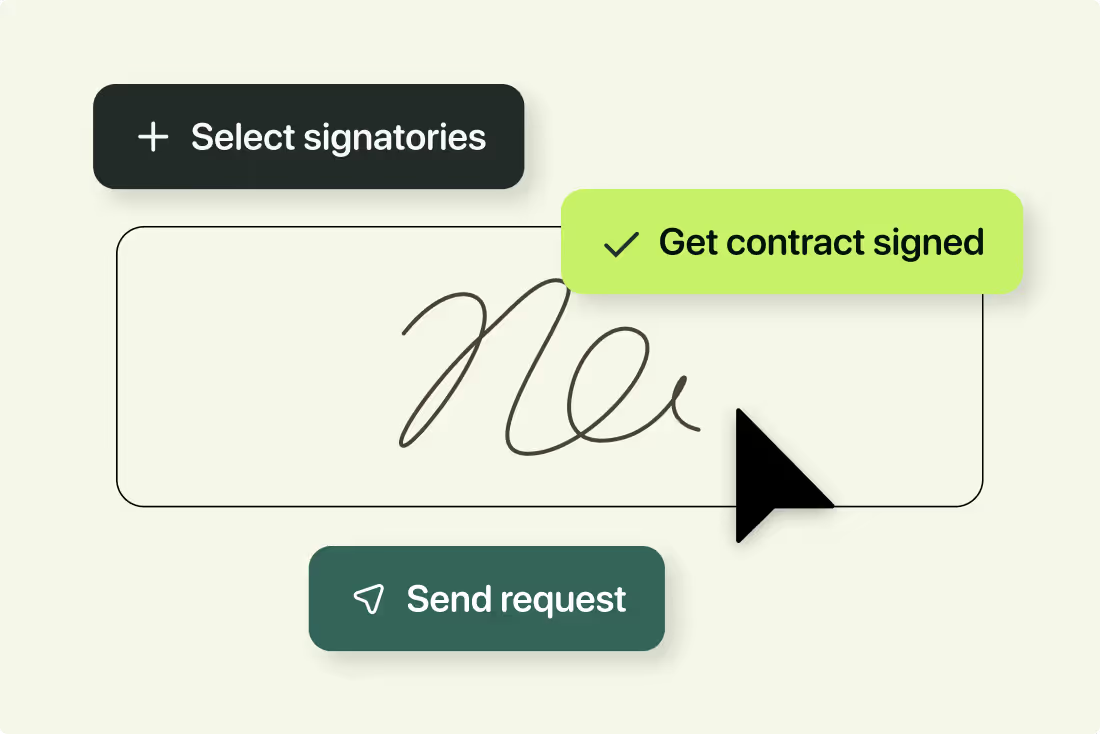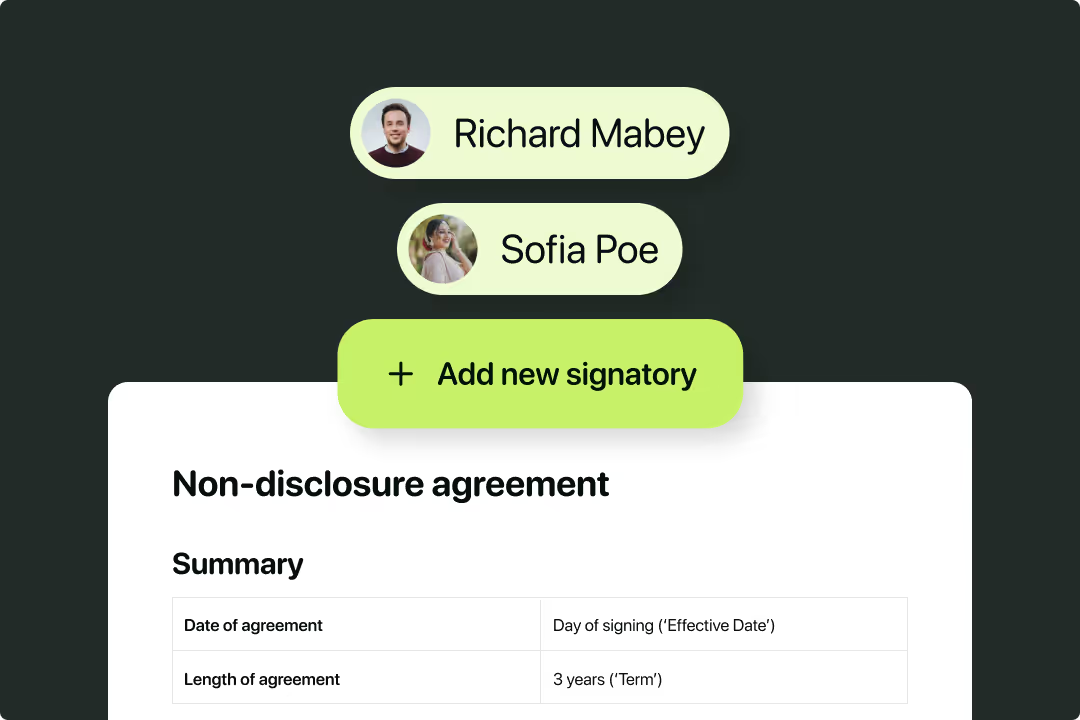Solutions
Customer Support
Resources
The eIDAS Regulation changed the game for businesses operating within the EU.
Whilst contracts were previously expected to be signed in-person or in wet ink, the eIDAS Regulation empowered businesses and customers to sign contracts digitally and securely, paving the way for easier cross-border transactions.
But what actually is eIDAS and what does it mean for the way your business handles contracts in 2026?
The deep-dive discusses everything you need to know about eIDAS, from why it was created to who it applies to and how you can use Juro’s fully-compliant eSignature solution for your routine contracts.
Want to find out more about how Juro enables legal and business teams to securely sign contracts online? Hit the button below. To find out more about eIDAS, keep reading.

eIDAS is an EU regulation, also known as the Electronic Identification and Trust Services Regulation, or eIDAS Regulation 910/2014/EC.
The regulation attempts to standardize the rules that apply to electronic signatures and identities across the European Union and empower businesses like yours to digitize more of your business processes and administrative tasks, like signing contracts.
In short, the regulation has set standards that, if met, would enable electronic signatures (and other technology) to carry the same legal weight as transactions that are performed in-person and on paper.
For instance, the regulation now requires EU member states to recognise electronic signatures as legally valid, so long as they meet the standards set out in the eIDAS regulation.
With scaling businesses becoming increasingly reliant on digital strategy and cross-border transactions to spur their growth, the European Commission wanted to introduce this regulation to encourage this ongoing innovation.
The overarching goal of the eIDAS regulation was to enable businesses and customers to carry out electronic transactions seamlessly and securely, with minimal risk. It was also designed to eliminate the need for parties to be sign contracts and other legal documents in-person in order to identify a party’s identity.

Instead, it introduces new, widely recognized methods of identification that can be carried out digitally and from other jurisdictions.
For businesses that want to acquire customers and build new relationships digitally, the eIDAS regulation empowers them to do so. But what does this mean in practice?
Well, it means your business can now close deals online, removing potential bottlenecks from your sales and hiring processes. It means that, when using a tool like Juro, you can speed up the time to signing, collaborate on contracts flexibly and reduce the burdensome administrative processes usually associated with closing a new client.
However, the benefits of the eIDAS go beyond just making it easier and more efficient for your business to acquire new customers. There are also additional benefits to eIDAS, such as that:
But most importantly, it makes cross-border electronic transactions more secure and reliable, making it more trustworthy to conduct important business, like agreeing and signing contracts digitally.
Previously, parties had to rely on wet ink signatures that were either created in-person or added to documents to then be shared via email, saved, printed, signed and scanned ready to send back to the other party. This was laborious and time-consuming, causing delays in getting contracts signed and over the line.
Under the eIDAS regulation, it’s up to individual businesses which category of electronic signature they wish to use, so long as they comply with the standards outlined by the relevant member states. The regulation outlines three different types of eSignature:
Simple Electronic Signatures is a label used to group all eSignatures that aren’t advanced or qualified. However, they cannot be refused legal admissibility simply because they are in digital form rather than physical form.
Also referred to as just ‘electronic signatures’, the simple eSignature is the most popular eSignature used by businesses, since they meet the minimum security requirements required for document signing.
Under the eIDAS regulation, Simple Electronic Signatures can be used to sign contracts without any process of identity verification, unlike the more advanced eSignature alternatives.
Advanced Electronic Signatures (AdES) are eSignatures that can be uniquely linked to the signer and the signer must be capable of being formally identified. They must also be created under the sole control of the signer, using their own device.
This level of eSignature is more than secure enough for signing routine business contracts, meanwhile, Qualified Electronic Signatures are usually reserved for more elaborate use cases.
This makes Advanced Electronic Signature perfect for embedding signatures directly into contracts.
The biggest difference between Qualified Electronic Signatures (QES) and Advanced Electronic Signatures is that Qualified Electronic Signatures are recognized in all EU member states.
As the most advanced form of eSignature, this type can be particularly burdensome and challenging to obtain. To achieve QES level, the signers must use a certificate-based digital ID issued by a qualified trust provider and use a qualified signature creation device, like a mobile app or a smart card with a single-use passcode.
As a result, this type of eSignature is usually only expected in specific circumstances that demand that level of security. This is because, in most business use cases, it would be impractical to obtain these.

Put simply, any individual or business that’s operating within the European Union will be expected to comply with the eIDAS Regulation when using electronic signatures, as all EU member states are subject to the regulation.
However, that doesn’t necessarily mean that all EU laws are standardized when it comes to outlining what type of signature is required for a contract to be valid. It is still up to each EU member state to decide in their national laws how effective eSignatures are legally.
For instance, when the UK was part of the EU, it still required land transfers to be signed by hand using wet ink in order to register it with HM Land Registry. Similarly, some European countries like Germany and Italy will require that certain documents be formally notarized, which can’t happen online.
That said, it’s rare that an eSignature will be invalid for business contracts, as electronic signatures are usually more than sufficient in security and validity when signing routine contracts online.
Therefore, if you’re looking for a way to get contracts agreed and signed quickly and efficiently, selecting a contract tool like Juro that offers native eSignature functionality is essential.
Juro is an all-in-one contract automation platform that provides native eSignature functionality as standard. Juro offers Advanced Electronic Signatures and complies with provisions of the eIDAS, E-SIGN and UETA acts, meaning it’s fully compliant with the eIDAS Regulation.
Juro's secure, binding eSignature means your teams won’t need to switch tools when getting contracts over the line as users can embed signatures directly into contracts without compromising on security.
To find out more about Juro’s eIDAS compliant eSignature, hit the big button below.
Lorem ipsum dolor sit amet, consectetur adipiscing elit. Suspendisse varius enim in eros elementum tristique. Duis cursus, mi quis viverra ornare, eros dolor interdum nulla, ut commodo diam libero vitae erat. Aenean faucibus nibh et justo cursus id rutrum lorem imperdiet. Nunc ut sem vitae risus tristique posuere.

